闻王昌龄左迁龙标遥有此寄中考题集锦
闻王昌龄左迁龙标遥有此寄赏析题及参考答案题锦
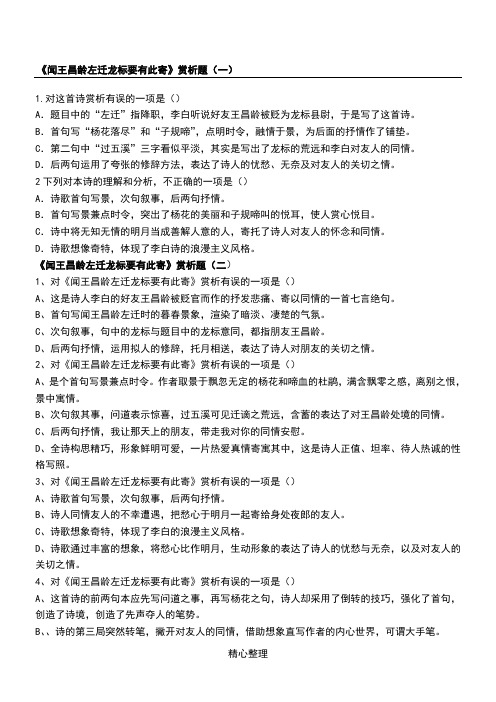
《闻王昌龄左迁龙标要有此寄》赏析题(一)1.对这首诗赏析有误的一项是()A.题目中的“左迁”指降职,李白听说好友王昌龄被贬为龙标县尉,于是写了这首诗。
B.首句写“杨花落尽”和“子规啼”,点明时令,融情于景,为后面的抒情作了铺垫。
C.第二句中“过五溪”三字看似平淡,其实是写出了龙标的荒远和李白对友人的同情。
D.后两句运用了夸张的修辞方法,表达了诗人的忧愁、无奈及对友人的关切之情。
2下列对本诗的理解和分析,不正确的一项是()A.诗歌首句写景,次句叙事,后两句抒情。
BCD《闻王昌龄左迁龙标要有此寄》赏析题(二)1ABCD2A满含飘零之感,离别之恨,BCD格写照。
3AB、诗人同情友人的不幸遭遇,把愁心于明月一起寄给身处夜郎的友人。
C、诗歌想象奇特,体现了李白的浪漫主义风格。
D、诗歌通过丰富的想象,将愁心比作明月,生动形象的表达了诗人的忧愁与无奈,以及对友人的关切之情。
4、对《闻王昌龄左迁龙标要有此寄》赏析有误的一项是()A、这首诗的前两句本应先写问道之事,再写杨花之句,诗人却采用了倒转的技巧,强化了首句,创造了诗境,创造了先声夺人的笔势。
B、、诗的第三局突然转笔,撇开对友人的同情,借助想象直写作者的内心世界,可谓大手笔。
C、最后一句诗人给予抽象的愁心以物的属性,让它随风逐月到夜郎西。
想象惊人,气概超逸,笔势灵动。
D、这首诗将叙事抒情巧妙的结合起来,充分显示出李白的艺术个性,也是本诗具有长久艺术魅力的原因所在。
5、对《闻王昌龄左迁龙标要有此寄》赏析有正确的一项是()A、这首诗是王昌龄为送别好友李白而作,表达了王昌龄对李白深切的同情和关切。
B、首句写景,诗人描写杨花飘落、子规啼叫烘托无限喜悦之情,情在景中,情景交融。
C、过五溪见迁谪之艰难、道路之荒远,并能从中见出诗人对朋友的关切之情。
D、后两句叙事,借用丰富而奇妙的艺术想象,真切地表达了诗人听到友人左迁,经受心灵震撼以后的强烈的主观感情。
答案《闻王昌龄左迁龙标要有此寄》赏析题(一)1、D2、B1、。
《闻王昌龄左迁龙标遥有此寄》历年中考试题汇编整理(2008-2018)
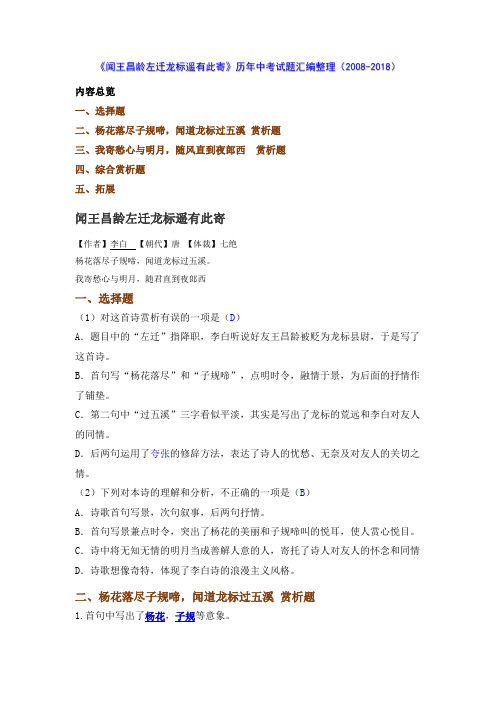
《闻王昌龄左迁龙标遥有此寄》历年中考试题汇编整理(2008-2018)内容总览一、选择题二、杨花落尽子规啼,闻道龙标过五溪赏析题三、我寄愁心与明月,随风直到夜郎西赏析题四、综合赏析题五、拓展闻王昌龄左迁龙标遥有此寄【作者】李白【朝代】唐【体裁】七绝杨花落尽子规啼,闻道龙标过五溪。
我寄愁心与明月,随君直到夜郎西一、选择题(1)对这首诗赏析有误的一项是(D)A.题目中的“左迁”指降职,李白听说好友王昌龄被贬为龙标县尉,于是写了这首诗。
B.首句写“杨花落尽”和“子规啼”,点明时令,融情于景,为后面的抒情作了铺垫。
C.第二句中“过五溪”三字看似平淡,其实是写出了龙标的荒远和李白对友人的同情。
D.后两句运用了夸张的修辞方法,表达了诗人的忧愁、无奈及对友人的关切之情。
(2)下列对本诗的理解和分析,不正确的一项是(B)A.诗歌首句写景,次句叙事,后两句抒情。
B.首句写景兼点时令,突出了杨花的美丽和子规啼叫的悦耳,使人赏心悦目。
C.诗中将无知无情的明月当成善解人意的人,寄托了诗人对友人的怀念和同情D.诗歌想像奇特,体现了李白诗的浪漫主义风格。
二、杨花落尽子规啼,闻道龙标过五溪赏析题1.首句中写出了杨花,子规等意象。
2.寓情于景是一种较为常见的表现手法,“杨花落尽子规啼”杨花,含飘零之感,子规有伤别之意。
这句诗表达了作者对故友贬谪遭遇的伤感哀怨之情。
3.诗人在诗的开头写景为什么选取“杨花”“子规”来写? (第一句选取了“杨花”与“子规”两个意象,有什么作用?)答:点明了暮春时令,点明主旨,营造悲凉、伤感的基调气氛。
杨花象征离别与漂泊,子规啼声悲哀别离,表达了作者对故友贬谪遭遇的同情哀怨之情。
4.诗人在“杨花落尽子规啼”—句里写了哪些景物?渲染了怎样的气氛? 答:杨花和子规鸟。
渲染了无限悲凉感伤的离别气氛。
5.古人在诗词中描写情境用来营造气氛的鸟儿很多,为什么李白独选“子规啼”来入诗呢?答:子归鸟叫声凄凉,有“不如归去”之意,古人用来作为悲情之鸟,李白用“子规啼”表示对朋友悲惨命运的忧虑,对朋友的挽留不舍之情。
中考语文诗歌鉴赏《闻王昌龄左迁龙标遥有此寄》含答案

中考语文诗歌鉴赏《闻王昌龄左迁龙标遥有此寄》含答案阅读下面的诗歌,完成下面小题。
闻王昌龄左迁龙标遥有此寄李白杨花落尽子规啼,闻道龙标过五溪。
我寄愁心与明月,随君直到夜郎西。
7.根据你的理解,在下面横线上填写恰当的内容。
本诗首句写景,描绘了一幅①的画面,第二句叙事,“龙标”“五溪”写出了②;后两句由写景言事转为抒情。
8.本诗中“我寄愁心与明月,随君直到夜郎西”与王维的《九月九日忆山东兄弟》中的“遥知兄弟登高处,遍插茱萸少一人”表达的都是对朋友或亲人的深厚情谊。
请结合诗句内容,任选一位诗人,简要说明诗人是如何抒发内心情感的。
【答案】7.暮春时节,柳絮已经落尽,杜鹃鸟不停地悲啼朋友被贬之偏远8.示例1:李白的诗运用拟人的修辞手法,通过奇特的想象,将明月人格化,把明月看成知人意、达人情的友好使者,寄托诗人的离愁和对被贬友人的同情、关切。
示例2:王维的诗运用联想,不直说自己思乡念亲,而是想象对方家人思念自己的情形,委婉含蓄地抒发深挚的情感。
【解析】7.本题考查诗歌内容理解。
一空,“杨花落尽子规啼”意为:在柳絮落尽,子规啼鸣之时。
此句写景兼点时令,诗人描写了暮春时节,柳絮已经落尽,杜鹃鸟不停地悲啼这一画面。
融情于景,饱含着飘零之感、离别之恨。
二空,“闻道龙标过五溪”意为:我听说您被贬为龙标尉,要经过五溪。
“龙标”“五溪”写出朋友被贬之偏远。
8.本题考查对比阅读。
“我寄愁心与明月,随君直到夜郎西”意为:我把我忧愁的心思寄托给明月,希望能随着风一直陪着你到夜郎以西。
诗人通过想象,赋予明月生命,将无知无情的明月,竟变成了一个了解自己、富于同情的知心人,借明月传达对友人的思念,情谊深挚。
“遥知兄弟登高处,遍插茱萸少一人”意为:遥想兄弟们今日登高望远时,头上插满茱萸只少我一人。
诗人运用联想,遥想远在家乡的兄弟,按照重阳节的风俗而登高时,也在怀念自己,诗意含蓄深沉,朴素自然,表现出诗人无限的思乡之情。
《闻王昌龄左迁龙标遥有此寄》题集
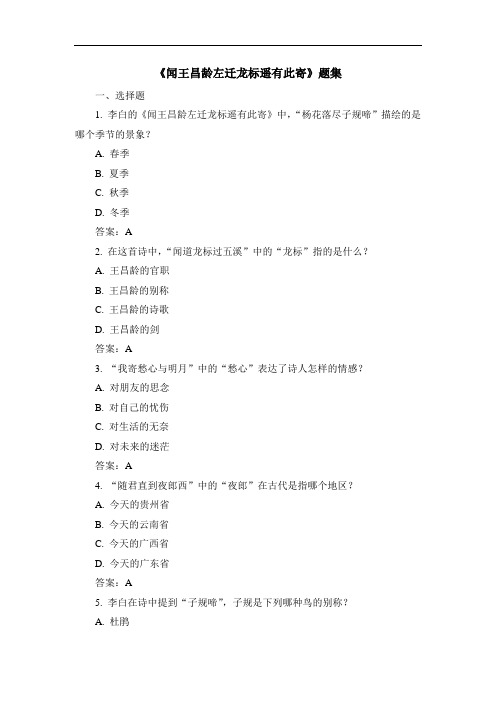
《闻王昌龄左迁龙标遥有此寄》题集一、选择题1. 李白的《闻王昌龄左迁龙标遥有此寄》中,“杨花落尽子规啼”描绘的是哪个季节的景象?A. 春季B. 夏季C. 秋季D. 冬季答案:A2. 在这首诗中,“闻道龙标过五溪”中的“龙标”指的是什么?A. 王昌龄的官职B. 王昌龄的别称C. 王昌龄的诗歌D. 王昌龄的剑答案:A3. “我寄愁心与明月”中的“愁心”表达了诗人怎样的情感?A. 对朋友的思念B. 对自己的忧伤C. 对生活的无奈D. 对未来的迷茫答案:A4. “随君直到夜郎西”中的“夜郎”在古代是指哪个地区?A. 今天的贵州省B. 今天的云南省C. 今天的广西省D. 今天的广东省答案:A5. 李白在诗中提到“子规啼”,子规是下列哪种鸟的别称?A. 杜鹃B. 黄鹂C. 布谷鸟D. 鹊答案:A6. “杨花落尽子规啼”中的“杨花”实际上是指什么?A. 杨树叶B. 柳絮C. 桃花D. 杏花答案:B7. “闻道龙标过五溪”中的“五溪”位于哪个省份?A. 湖南省B. 湖北省C. 广东省D. 广西省答案:A8. 李白在诗中将自己的情感寄托给“明月”,这种手法在文学创作中通常被称为什么?A. 比喻B. 拟人C. 象征D. 托物言志答案:D9. 《闻王昌龄左迁龙标遥有此寄》这首诗体现了哪种文学风格?A. 唐宋八大家B. 江西诗派C. 唐代边塞诗D. 盛唐山水诗答案:C10. 李白在诗中表达了对友人的深情,以下哪项不是诗中表达情感的方式?A. 通过自然景象描绘B. 通过直接抒情C. 通过历史典故D. 通过托物言志答案:C二、填空题1. 《闻王昌龄左迁龙标遥有此寄》这首诗是李白为好友王昌龄被贬谪而作,诗中的“杨花落尽子规啼”描绘了_______(填“春季”或“秋季”)的景象。
答案:春季2. 诗中“闻道龙标过五溪”表明王昌龄被贬至边远的地区,其中“五溪”指的是古代位于_______(填“湖南”或“湖北”)西部的少数民族地区。
李白《闻王昌龄左迁龙标遥有此寄》赏析试题集
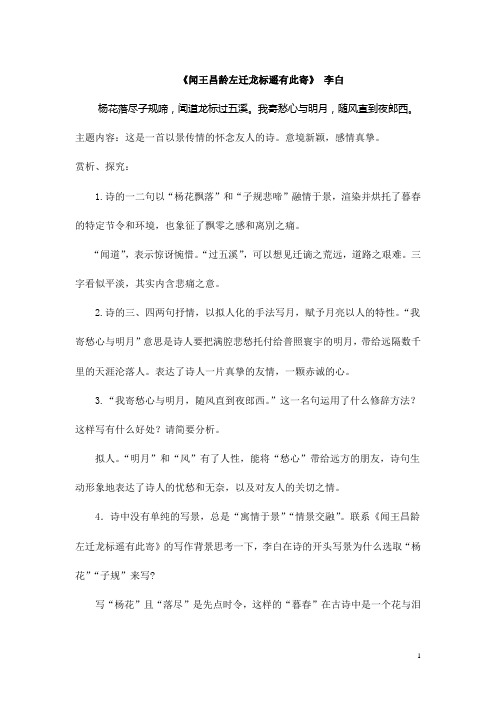
《闻王昌龄左迁龙标遥有此寄》李白杨花落尽子规啼,闻道龙标过五溪。
我寄愁心与明月,随风直到夜郎西。
主题内容:这是一首以景传情的怀念友人的诗。
意境新颖,感情真挚。
赏析、探究:1.诗的一二句以“杨花飘落”和“子规悲啼”融情于景,渲染并烘托了暮春的特定节令和环境,也象征了飘零之感和离別之痛。
“闻道”,表示惊讶惋惜。
“过五溪”,可以想见迁谪之荒远,道路之艰难。
三字看似平淡,其实内含悲痛之意。
2.诗的三、四两句抒情,以拟人化的手法写月,赋予月亮以人的特性。
“我寄愁心与明月”意思是诗人要把满腔悲愁托付给普照寰宇的明月,带给远隔数千里的天涯沦落人。
表达了诗人一片真挚的友情,一颗赤诚的心。
3.“我寄愁心与明月,随风直到夜郎西。
”这一名句运用了什么修辞方法?这样写有什么好处?请简要分析。
拟人。
“明月”和“风”有了人性,能将“愁心”带给远方的朋友,诗句生动形象地表达了诗人的忧愁和无奈,以及对友人的关切之情。
4.诗中没有单纯的写景,总是“寓情于景”“情景交融”。
联系《闻王昌龄左迁龙标遥有此寄》的写作背景思考一下,李白在诗的开头写景为什么选取“杨花”“子规”来写?写“杨花”且“落尽”是先点时令,这样的“暮春”在古诗中是一个花与泪同落的季候,这就奠定了全诗伤感的基调。
“杨花”漂泊无定,暗写王昌龄被贬荒僻之地给人的飘零流落之感;“子规”即杜鹃,在我国古典诗词中,它总悲哀凄惨地啼叫着。
因此,可以说,诗中开头一句的写景,不着悲痛之语,而悲痛之意自现。
5.诗中融情入景,含有飘零之感、离别之恨的句子是:杨花落尽子规啼,闻道龙标过五溪。
《闻王昌龄左迁龙标要有此寄》李白中考综合复习题及答案【部编版七年级上册】
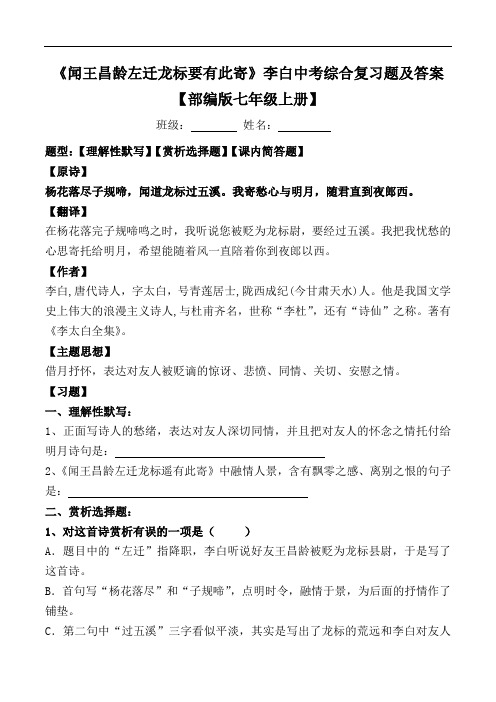
《闻王昌龄左迁龙标要有此寄》李白中考综合复习题及答案【部编版七年级上册】班级:姓名:题型:【理解性默写】【赏析选择题】【课内简答题】【原诗】杨花落尽子规啼,闻道龙标过五溪。
我寄愁心与明月,随君直到夜郎西。
【翻译】在杨花落完子规啼鸣之时,我听说您被贬为龙标尉,要经过五溪。
我把我忧愁的心思寄托给明月,希望能随着风一直陪着你到夜郎以西。
【作者】李白,唐代诗人,字太白,号青莲居士,陇西成纪(今甘肃天水)人。
他是我国文学史上伟大的浪漫主义诗人,与杜甫齐名,世称“李杜”,还有“诗仙”之称。
著有《李太白全集》。
【主题思想】借月抒怀,表达对友人被贬谪的惊讶、悲愤、同情、关切、安慰之情。
【习题】一、理解性默写:1、正面写诗人的愁绪,表达对友人深切同情,并且把对友人的怀念之情托付给明月诗句是:2、《闻王昌龄左迁龙标遥有此寄》中融情人景,含有飘零之感、离别之恨的句子1、对这首诗赏析有误的一项是()A.题目中的“左迁”指降职,李白听说好友王昌龄被贬为龙标县尉,于是写了这首诗。
B.首句写“杨花落尽”和“子规啼”,点明时令,融情于景,为后面的抒情作了铺垫。
C.第二句中“过五溪”三字看似平淡,其实是写出了龙标的荒远和李白对友人的同情。
D.后两句运用了夸张的修辞方法,表达了诗人的忧愁、无奈及对友人的关切之情。
2、下面是对李白《闻王昌龄左迁龙标遥有此寄》的分析,不正确的一项是()A.首句中,“杨花”且“落尽”是先点时令,这样的“暮春”在古诗中是一个花与泪同落的季候,这就奠定了全诗伤感的基调。
B.次句直叙其事。
“闻道”,表示惊惜。
“过五溪”,见迁谪之荒远,道路之艰难。
不着悲痛之语,而悲痛之意自见。
C.后两句诗作者大胆想象,直接袒露自己听到朋友远谪后的内心情感:对好友身遭贬谪的同情,是对好友长途跋涉的担忧;是陪伴友人一路前行的一片深情,是告慰友人并不孤单的一种情怀……D.“我寄愁心与明月,随君直到夜郎西!”通过丰富的想象,运用比喻手法,将“愁心”比“明月”,生动形象地表达了诗人的忧愁和无奈,以及对友人的关切之情。
闻王昌龄左迁龙标遥有此寄 中考题
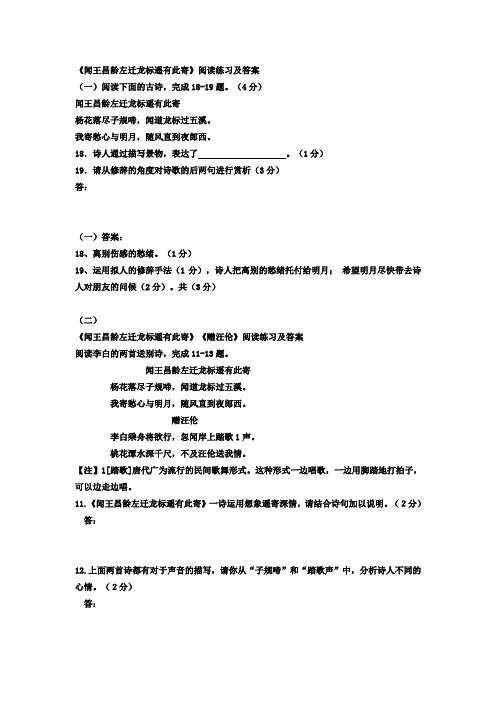
《闻王昌龄左迁龙标遥有此寄》阅读练习及答案(一)阅读下面的古诗,完成18-19题。
(4分)闻王昌龄左迁龙标遥有此寄杨花落尽子规啼,闻道龙标过五溪。
我寄愁心与明月,随风直到夜郎西。
18.诗人通过描写景物,表达了。
(1分)19.请从修辞的角度对诗歌的后两句进行赏析(3分)答:(一)答案:18、离别伤感的愁绪。
(1分)19、运用拟人的修辞手法(1分),诗人把离别的愁绪托付给明月;希望明月尽快带去诗人对朋友的问候(2分)。
共(3分)(二)《闻王昌龄左迁龙标遥有此寄》《赠汪伦》阅读练习及答案阅读李白的两首送别诗,完成11-13题。
闻王昌龄左迁龙标遥有此寄杨花落尽子规啼,闻道龙标过五溪。
我寄愁心与明月,随风直到夜郎西。
赠汪伦李白乘舟将欲行,忽闻岸上踏歌1声。
桃花潭水深千尺,不及汪伦送我情。
【注】1[踏歌]唐代广为流行的民间歌舞形式。
这种形式一边唱歌,一边用脚踏地打拍子,可以边走边唱。
11.《闻王昌龄左迁龙标遥有此寄》一诗运用想象遥寄深情,请结合诗句加以说明。
(2分)答:12.上面两首诗都有对于声音的描写,请你从“子规啼”和“踏歌声”中,分析诗人不同的心情。
(2分)答:13.古诗词中有许多送别诗,请你再写出两句表达送别之情的诗句。
(2分),。
(写出连续两句)(二)答案:11.答案示例:《闻王昌龄左迁龙标遥有此寄》中诗人李白通过丰富的想象,把“愁心”寄托给了“明月”,让“明月”随风陪伴友人直到夜郎西,将自己对朋友的怀念和同情也带到那里,表达了对友人的深情厚谊。
(2分。
用诗句解释想象1分,分析情感1分)12.答案示例:“子规啼”写杜鹃鸟的叫声哀婉凄切,反映了诗人沉重忧伤的心情;“踏歌声”写用歌声送别,悠扬轻快,反映出诗人轻松的心情。
(2分,每个要点1分)13. 答案示例一:海内存知己,天涯若比邻。
答案示例二:劝君更尽一杯酒,西出阳关无故人。
答案示例三:故人西辞黄鹤楼,烟花三月下扬州。
(2分,每空1分,该空有错不得分。
《闻王昌龄左迁龙标遥有此寄》历年中考试题汇编整理(2008-2018)

三、我寄愁心与明月,随风直到夜郎西 赏析题 1.诗中“我寄愁心与明月,随风直到夜郎西”抒发了作者 怎样的感情? 答:作者对故友贬谪遭遇的关心、同情、思念牵挂之情。 2.“我寄愁心与明月,随君直到夜郎西!”,这一名句运 用了什么修辞方法?这样写有什么好处?请简要分析。 (赏析“我寄愁心与明月,随君直到夜郎西!”) 答:修辞及表达情感角度:拟人。将月亮人格化,赋予了 明月以人的情感色彩。诗人通过丰富的想象,把明月当作 使善解人意的知心人,把自己对朋友的怀念和同情带到夜 郎西。生动形象地表达了诗人的同情无奈,以及对友人的 关心与牵挂。
(2)下列对本诗的理解和分析,不正确的一项是( B ) A.诗歌首句写景,次句叙事,后两句抒情。 B.首句写景兼点时令,突出了杨花的美丽和子规啼叫的 悦耳,使人赏心悦目。 C.诗中将无知无情的明月当成善解人意的人,寄托了诗 人对友人的怀念和同情 D.诗歌想像奇特,体现了李白诗的浪漫主义风格。
二、杨花落尽子规啼,闻道龙标过五溪 赏析题 杨花 、 子规 1.首句中写出了_____ ______,等意象。 2.寓情于景是一种较为常见的表现手法,“杨花落尽子规 飘零之感 ,子规有 伤别之意 啼”杨花,含___________ ________。这句诗表 伤感哀怨 之情。 达了作者对故友贬谪遭遇的__________ 3.诗人在诗的开头写景为什么选取“杨花”“子规”来写? (第一句选取了“杨花”与“子规”两个意象,有什么作 用?) 答:点明了暮春时令,点明主旨,营造悲凉、伤感的基调 气氛。杨花象征离别与漂泊,子规啼声悲哀别离,表达了 作者对故友贬谪遭遇的悲苦哀怨之情。
一、选择题 (1)对这首诗赏析有误的一项是() D A.题目中的“左迁”指降职,李白听说好友王昌龄被贬 为龙标县尉,于是写了这首诗。 B.首句写“杨花落尽”和“子规啼”,点明时令,融情 于景,为后面的抒情作了铺垫。 C.第二句中“过五溪”三字看似平淡,其实是写出了龙 标的荒远和李白对友人的同情。 D.后两句运用了夸张的修辞方法,表达了诗人的忧愁、 无奈及对友人的关切之情。
《闻王昌龄左迁龙标遥有此寄》中考赏析题

闻王昌龄左迁龙标遥有此寄诗歌赏析中考试题汇编李白杨花落尽子规啼;闻道龙标过五溪..我寄愁心与明月;随君直到夜郎西..思想内容表现对友人深深的同情和关切..名句赏析后两句;面对朋友被贬往荒凉僻远的地方;自己远隔千里;无法相送;诗人只好委托明月把一颗愁心带到朋友的身边;伴随朋友前往贬谪之地;分担他的痛苦..月亮本是无知无情的;但诗人通过丰富的想像;赋予了月亮以人的情感色彩;将月亮人格化了..五年中考试题汇编闻王昌龄左迁龙标遥有此寄李白杨花落尽子规啼;闻道龙标过五溪..我寄愁心与明月;随风直到夜郎西..1首句中有哪些意象;请写出来..2分2诗中“我寄愁心与明月;随风直到夜郎西”抒发了作者怎样的感情 2分参考答案1杨花;子规2分;如果答“扬花纷纷”“子规悲鸣”类的答案只可得1分..2抒发了诗人对远方的友人的关心;思念和同感情..答到一点得1分;答到两点或两点以上可得2分闻王昌龄左迁龙标遥有此寄李白杨花落尽子规啼;闻道龙标过五溪..我寄愁心与明月;随风直到夜郎西..选自语文七年级上注①左迁:贬官降职;②杨花;柳絮;③子规;杜鹃鸟;又称布谷鸟:④五溪:指雄溪、蒲溪、酉溪、沅溪、辰溪;其流域在今湖南西、贵州东;⑤夜郎;这里指湖南省黔阳县..⑴“杨花”“子规”在诗中象征什么诗人为什么要写“杨花落”“子规啼”⑵诗歌后两句语言凝练;内涵丰富;你从中读出了哪三层意思选答两层参考答案22.⑴运用比喻;诗人抓住“新月”与“小船”外形上“弯弯”这一共同特征;将两个相距遥远的物体联系在一起;这两句诗是全诗的引子;后面内容都围绕这两句诗或引出诗歌后面内容..⑵花香、夜暖、春天;强烈的赞美之情和浓烈的思乡之情..23.⑴象征飘零之感和离别之痛;点明特定时令;渲染或“烘托”暮春环境..⑵诗人只能把自己的愁思托付给明月;诗人和朋友可以同时看到高照的明月;希望明月尽快带去诗人对朋友的问候..闻王昌龄左迁龙标遥有此寄李白杨花落尽子规啼;闻道龙标过五溪..我寄愁心与明月;随风直到夜郎西..1.诗人在“杨花落尽子规啼”—句里写了哪些景物渲染了怎样的气氛 2分2.从“我寄愁心与明月;随风直到夜郎西”两句中;你解读出了诗人哪些情感 3分参考答案1.杨花和子规鸟..渲染了无限悲凉感伤的气氛..2.诗人听说友人将左迁龙标时的惆怅和恋恋不舍之情..闻王昌龄左迁龙标遥有此寄李白杨花落尽子规啼;闻道龙标过五溪..我寄愁心与明月;随君直到夜郎西..1.诗人通过哪些景物表达离别伤感的愁绪 2分_____________________________________________________________________2.在“我寄愁心与明月;随君直到夜郎西”一句中;诗人运用了拟人、想象、情景交融等手法;请任选一个角度;结合诗句内容分析其作用..2分_____________________________________________________________________ 参考答案14.杨花、子规、明月、风两个即可15.示例①拟人修辞;把明月当作使者;表达对友人的同情与关切..示例②奇特的想象;把无知无情的明月;想像成善解人意的知心人;把自己对朋友的怀念和同情带到夜郎西..示例③情景交融或以景传情、借景抒情;把明月之景与对朋友的思念之情交融在一起;表达自己对朋友的怀念和同情..2017·沈阳中考下面两首诗闻王昌龄左迁龙标遥有此寄唐李白杨花落尽子规啼;闻道龙标过五溪..我寄愁心与明月;随风直到夜郎西..别夔州官吏①唐刘禹锡三年楚国巴城守;一去扬州扬子津..青帐②联延喧驿步③;白头俯伛④到江滨..巫山暮色常含雨;峡水秋来不恐人..惟有九歌⑤词数首;里中留与赛蛮神⑥.注释①此诗是诗人调任之际所作..②青帐:指饯别宴席所设的青色帐篷..③步:码头..④白头俯伛:指当地年老的百姓俯身曲背..⑤九歌:这里指诗人在夔州所作的九首竹枝词.⑥蛮神:夔州在西南边地;故称当地供奉的是蛮神..对两首诗理解和分析不恰当的一项是_D_A.闻王昌龄左迁龙标遥有此寄中诗人托明月以达情;表现了他对贬谪好友的关切和同情;写的深切动人..B.别夔州官吏写于诗人调任之际;三、四两句通过写人们送行的场面;表现他们对诗人的惜别之情..C.闻王昌龄左迁龙标遥有此寄中“花落尽子规啼”和别夔州官吏中“峡水秋来不恐人”都是写景兼写时令..D.闻王昌龄左迁龙标遥有此寄表达了诗人对友人的牵挂;别夔州官吏则流露出诗人对隐居生活的向往..。
《闻王昌龄左迁龙标要有此寄》中考习题及答案【部编版七年级上册】
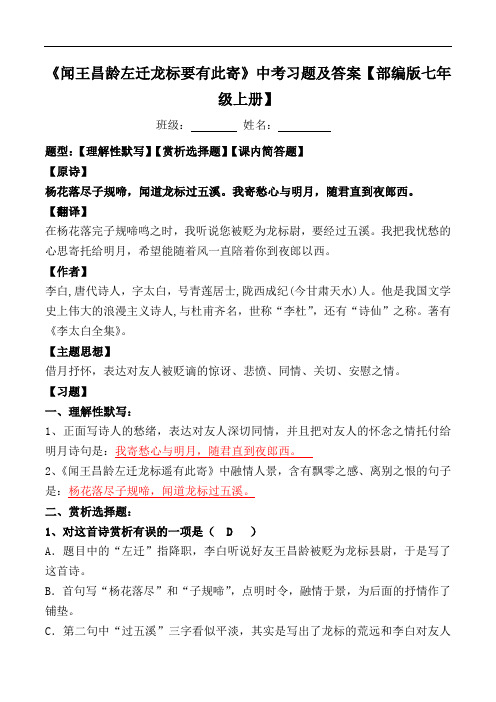
《闻王昌龄左迁龙标要有此寄》中考习题及答案【部编版七年级上册】班级:姓名:题型:【理解性默写】【赏析选择题】【课内简答题】【原诗】杨花落尽子规啼,闻道龙标过五溪。
我寄愁心与明月,随君直到夜郎西。
【翻译】在杨花落完子规啼鸣之时,我听说您被贬为龙标尉,要经过五溪。
我把我忧愁的心思寄托给明月,希望能随着风一直陪着你到夜郎以西。
【作者】李白,唐代诗人,字太白,号青莲居士,陇西成纪(今甘肃天水)人。
他是我国文学史上伟大的浪漫主义诗人,与杜甫齐名,世称“李杜”,还有“诗仙”之称。
著有《李太白全集》。
【主题思想】借月抒怀,表达对友人被贬谪的惊讶、悲愤、同情、关切、安慰之情。
【习题】一、理解性默写:1、正面写诗人的愁绪,表达对友人深切同情,并且把对友人的怀念之情托付给明月诗句是:我寄愁心与明月,随君直到夜郎西。
2、《闻王昌龄左迁龙标遥有此寄》中融情人景,含有飘零之感、离别之恨的句子1、对这首诗赏析有误的一项是( D )A.题目中的“左迁”指降职,李白听说好友王昌龄被贬为龙标县尉,于是写了这首诗。
B.首句写“杨花落尽”和“子规啼”,点明时令,融情于景,为后面的抒情作了铺垫。
C.第二句中“过五溪”三字看似平淡,其实是写出了龙标的荒远和李白对友人的同情。
D.后两句运用了夸张的修辞方法,表达了诗人的忧愁、无奈及对友人的关切之情。
【解析】D后两句运用了拟人的修辞。
2、下面是对李白《闻王昌龄左迁龙标遥有此寄》的分析,不正确的一项是( D )A.首句中,“杨花”且“落尽”是先点时令,这样的“暮春”在古诗中是一个花与泪同落的季候,这就奠定了全诗伤感的基调。
B.次句直叙其事。
“闻道”,表示惊惜。
“过五溪”,见迁谪之荒远,道路之艰难。
不着悲痛之语,而悲痛之意自见。
C.后两句诗作者大胆想象,直接袒露自己听到朋友远谪后的内心情感:对好友身遭贬谪的同情,是对好友长途跋涉的担忧;是陪伴友人一路前行的一片深情,是告慰友人并不孤单的一种情怀……D.“我寄愁心与明月,随君直到夜郎西!”通过丰富的想象,运用比喻手法,将“愁心”比“明月”,生动形象地表达了诗人的忧愁和无奈,以及对友人的关切之情。
闻王昌龄左迁龙标遥有此寄》历年中考试题汇编整理(2008-2019)
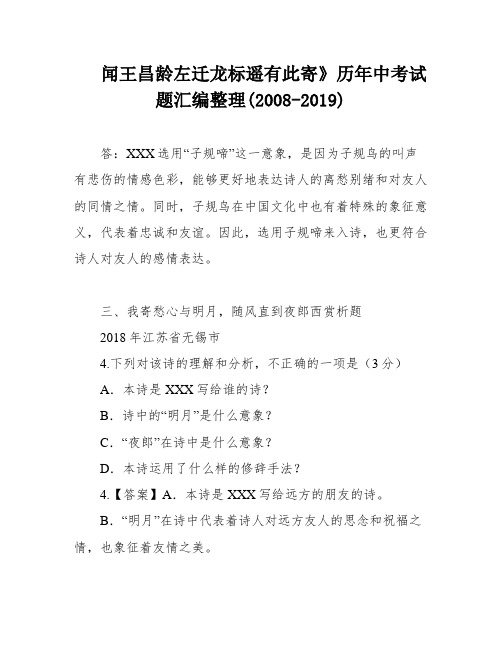
闻王昌龄左迁龙标遥有此寄》历年中考试题汇编整理(2008-2019)答:XXX选用“子规啼”这一意象,是因为子规鸟的叫声有悲伤的情感色彩,能够更好地表达诗人的离愁别绪和对友人的同情之情。
同时,子规鸟在中国文化中也有着特殊的象征意义,代表着忠诚和友谊。
因此,选用子规啼来入诗,也更符合诗人对友人的感情表达。
三、我寄愁心与明月,随风直到夜郎西赏析题2018年江苏省无锡市4.下列对该诗的理解和分析,不正确的一项是(3分)A.本诗是XXX写给谁的诗?B.诗中的“明月”是什么意象?C.“夜郎”在诗中是什么意象?D.本诗运用了什么样的修辞手法?4.【答案】A.本诗是XXX写给远方的朋友的诗。
B.“明月”在诗中代表着诗人对远方友人的思念和祝福之情,也象征着友情之美。
C.“夜郎”在诗中是指远离中原的西南边陲地区,代表着远方。
D.本诗运用了比喻、拟人、排比等修辞手法,表达了诗人对友情的珍视和思念之情。
该诗是XXX写给远方的朋友的诗,表达了诗人对友情的珍视和思念之情。
诗中的“明月”是代表着诗人对远方友人的思念和祝福之情,也象征着友情之美。
而“夜郎”在诗中则是指远离中原的西南边陲地区,代表着远方。
诗中运用了比喻、拟人、排比等修辞手法,表达了诗人对友情的珍视和思念之情。
四、综合赏析题2016年江苏省南京市6.下列诗句中,哪些属于描写景物的句子?哪些属于抒发情感的句子?(2分)XXX尽子规啼,闻道龙标过五溪。
”我寄愁心与明月,随君直到夜郎西。
”6.【答案】描写景物的句子:“杨花落尽子规啼,闻道龙标过五溪。
”抒发情感的句子:“我寄愁心与明月,随君直到夜郎西。
”该诗的第一句“杨花落尽子规啼,闻道龙标过五溪”是描写景物的句子,通过描绘杨花的凋谢和子规的啼叫,表现了诗人对友人遭遇的同情和哀伤之情。
而第二句“我寄愁心与明月,随君直到夜郎西”则是抒发情感的句子,表达了诗人对友情的珍视和思念之情。
通过这两句诗的对比,诗人成功地将景物描写和情感抒发相结合,形成了深刻的意境和情感共鸣。
《闻王昌龄左迁龙标遥有此寄》《夜上受降城闻笛》中考古诗词阅读练习及答案(2020年福建省中考题)
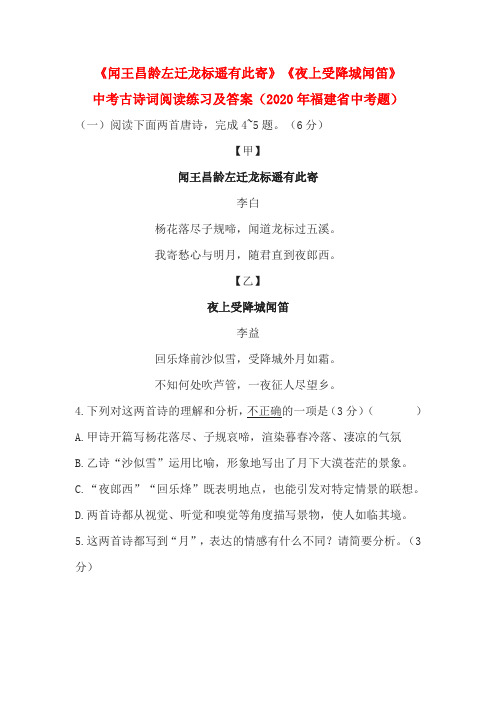
《闻王昌龄左迁龙标遥有此寄》《夜上受降城闻笛》
中考古诗词阅读练习及答案(2020年福建省中考题)(一)阅读下面两首唐诗,完成4~5题。
(6分)
【甲】
闻王昌龄左迁龙标遥有此寄
李白
杨花落尽子规啼,闻道龙标过五溪。
我寄愁心与明月,随君直到夜郎西。
【乙】
夜上受降城闻笛
李益
回乐烽前沙似雪,受降城外月如霜。
不知何处吹芦管,一夜征人尽望乡。
4.下列对这两首诗的理解和分析,不正确的一项是(3分)()
A.甲诗开篇写杨花落尽、子规哀啼,渲染暮春冷落、凄凉的气氛
B.乙诗“沙似雪”运用比喻,形象地写出了月下大漠苍茫的景象。
C.“夜郎西”“回乐烽”既表明地点,也能引发对特定情景的联想。
D.两首诗都从视觉、听觉和嗅觉等角度描写景物,使人如临其境。
5.这两首诗都写到“月”,表达的情感有什么不同?请简要分析。
(3分)
答案:
(一)(6分)
4.(3分)D
5.(3分)甲诗想象奇特,借明月表达对友人的思念和牵挂;乙诗描写“月”,表现边塞的苦寒,衬托征人思乡的愁绪。
评分说明:意思答对即可。
《闻王昌龄左迁龙标遥有此寄》《夜上受降城闻笛》中考古诗词阅读练习及答案(2020年福建省中考题)

《闻王昌龄左迁龙标遥有此寄》《夜上受降城闻笛》
中考古诗词阅读练习及答案(2020年福建省中考题)(一)阅读下面两首唐诗,完成4~5题。
(6分)
【甲】
闻王昌龄左迁龙标遥有此寄
李白
杨花落尽子规啼,闻道龙标过五溪。
我寄愁心与明月,随君直到夜郎西。
【乙】
夜上受降城闻笛
李益
回乐烽前沙似雪,受降城外月如霜。
不知何处吹芦管,一夜征人尽望乡。
4.下列对这两首诗的理解和分析,不正确的一项是(3分)()
A.甲诗开篇写杨花落尽、子规哀啼,渲染暮春冷落、凄凉的气氛
B.乙诗“沙似雪”运用比喻,形象地写出了月下大漠苍茫的景象。
C.“夜郎西”“回乐烽”既表明地点,也能引发对特定情景的联想。
D.两首诗都从视觉、听觉和嗅觉等角度描写景物,使人如临其境。
5.这两首诗都写到“月”,表达的情感有什么不同?请简要分析。
(3分)
答案:
(一)(6分)
4.(3分)D
5.(3分)甲诗想象奇特,借明月表达对友人的思念和牵挂;乙诗描写“月”,表现边塞的苦寒,衬托征人思乡的愁绪。
评分说明:意思答对即可。
中考试题:李白《闻王昌龄左迁龙标遥有此寄》
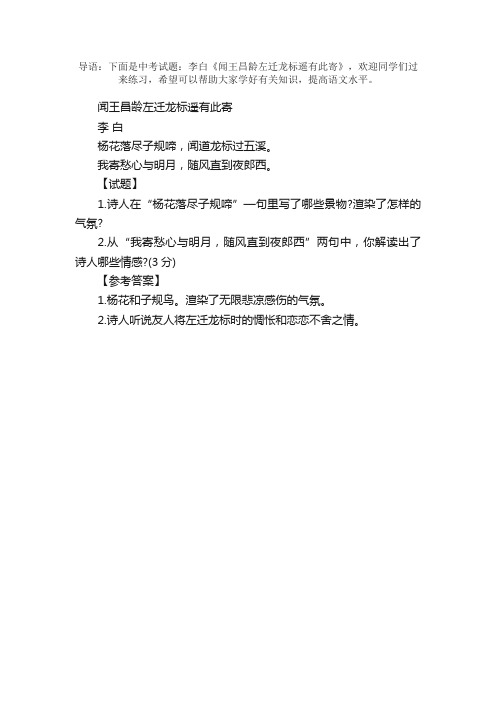
导语:下面是中考试题:李白《闻王昌龄左迁龙标遥有此寄》,欢迎同学们过来练习,希望可以帮助大家学好有关知识,提高语文水平。
闻王昌龄左迁龙标遥有此寄
李白
杨花落尽子规啼,闻道龙标过五溪。
我寄愁心与明月,随风直到夜郎西。
【试题】
1.诗人在“杨花落尽子规啼”—句里写了哪些景物?渲染了怎样的气氛?
2.从“我寄愁心与明月,随风直到夜郎西”两句中,你解读出了诗人哪些情感?(3分)
【参考答案】
1.杨花和子规鸟。
渲染了无限悲凉感伤的气氛。
2.诗人听说友人将左迁龙标时的惆怅和恋恋不舍之情。
《闻王昌龄左迁龙标遥有此寄》中考古诗词阅读练习及答案(六)
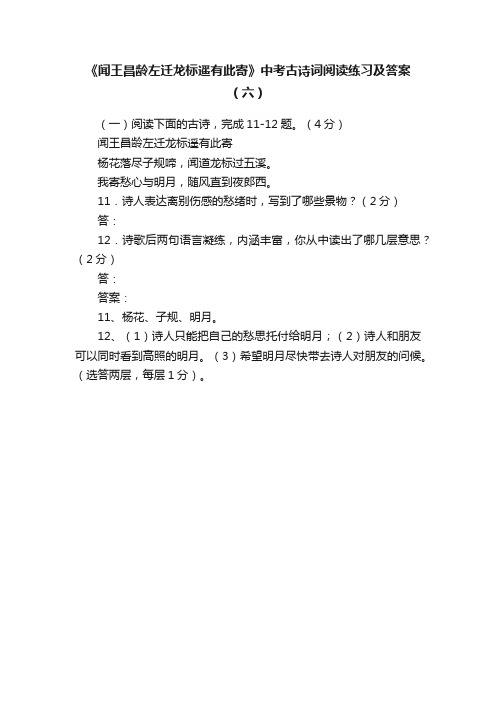
《闻王昌龄左迁龙标遥有此寄》中考古诗词阅读练习及答案
(六)
(一)阅读下面的古诗,完成11-12题。
(4分)
闻王昌龄左迁龙标遥有此寄
杨花落尽子规啼,闻道龙标过五溪。
我寄愁心与明月,随风直到夜郎西。
11.诗人表达离别伤感的愁绪时,写到了哪些景物?(2分)
答:
12.诗歌后两句语言凝练,内涵丰富,你从中读出了哪几层意思?(2分)
答:
答案:
11、杨花、子规、明月。
12、(1)诗人只能把自己的愁思托付给明月;(2)诗人和朋友可以同时看到高照的明月。
(3)希望明月尽快带去诗人对朋友的问候。
(选答两层,每层1分)。
02 七上《闻王昌龄左迁龙标遥有此寄》选择题专练-冲刺2024年中考语文古代诗歌课内篇目常考题型专练
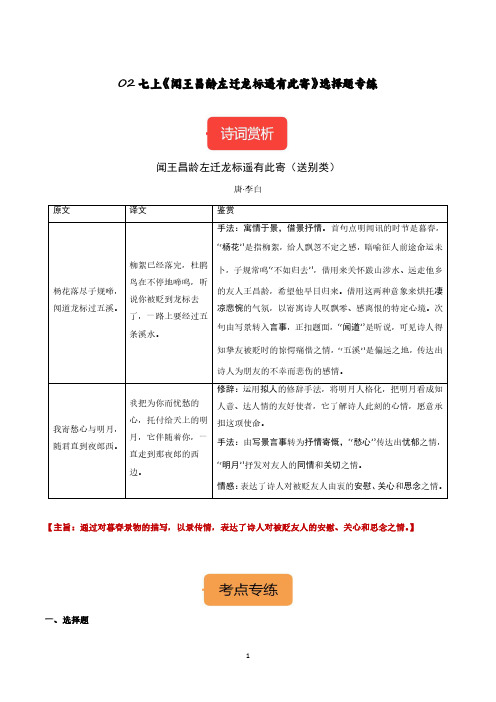
02七上《闻王昌龄左迁龙标遥有此寄》选择题专练闻王昌龄左迁龙标遥有此寄(送别类)唐·李白原文译文鉴赏杨花落尽子规啼,闻道龙标过五溪。
柳絮已经落完,杜鹃鸟在不停地啼鸣,听说你被贬到龙标去了,一路上要经过五条溪水。
手法:寓情于景,借景抒情。
首句点明闻讯的时节是暮春,“杨花”是指柳絮,给人飘忽不定之感,暗喻征人前途命运未卜,子规常鸣“不如归去”,借用来关怀跋山涉水、远走他乡的友人王昌龄,希望他早日归来。
借用这两种意象来烘托凄凉悲惋的气氛,以寄寓诗人叹飘零、感离恨的特定心境。
次句由写景转入言事,正扣题面,“闻道”是听说,可见诗人得知挚友被贬时的惊愕痛惜之情,“五溪”是偏远之地,传达出诗人为朋友的不幸而悲伤的感情。
我寄愁心与明月,随君直到夜郎西。
我把为你而忧愁的心,托付给天上的明月,它伴随着你,一直走到那夜郎的西边。
修辞:运用拟人的修辞手法,将明月人格化,把明月看成知人意、达人情的友好使者,它了解诗人此刻的心情,愿意承担这项使命。
手法:由写景言事转为抒情寄慨,“愁心”传达出忧郁之情,“明月”抒发对友人的同情和关切之情。
情感:表达了诗人对被贬友人由衷的安慰、关心和思念之情。
【主旨:通过对暮春景物的描写,以景传情,表达了诗人对被贬友人的安慰、关心和思念之情。
】一、选择题1.读下面的诗歌,下列说法正确的一项是()闻王昌龄左迁龙标遥有此寄〔唐〕李白杨花落尽子规啼,闻道龙标过五溪。
我寄愁心与明月,随君直到夜郎西。
A.本诗作者李白,字太白,号香山居士,是我国唐代伟大的浪漫主义诗人,被后人誉为“诗仙”。
B.题目中的“左迁”是升职的意思。
作者李白在听到友人王昌龄升职加官后,写下此诗寄给友人表示祝贺。
C.前两句诗融情入景,表达诗人的关切。
其中,“闻道龙标过五溪”一句表达了作者在听说王昌龄走过了“五溪”艰难之地后的欣慰之情,既点名题目,又为下两句抒情作了铺垫。
D.诗歌后两句运用拟人,情景交融,将月亮人格化,把眼前的明月之景与对遥远朋友的关切和思念之情交融在一起。
中考古诗赏析《闻王昌龄左迁龙标遥有此寄》《夜上受降城闻笛》练习及答案解析
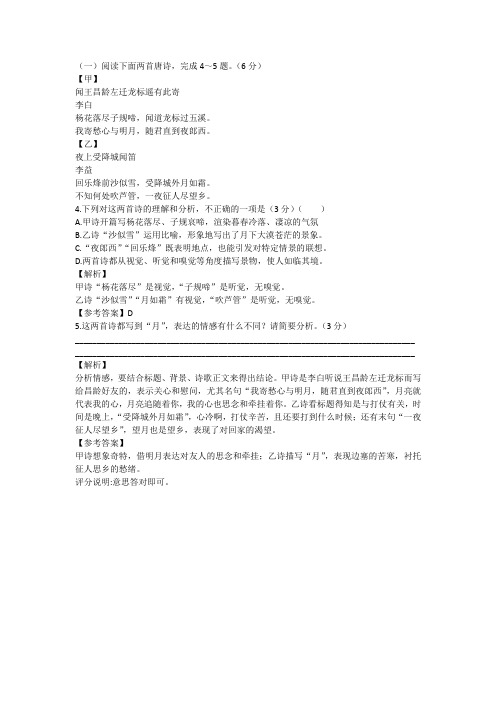
【甲】
闻王昌龄左迁龙标遥有此寄
李白
杨花落尽子规啼,闻道龙标过五溪。
我寄愁心与明月,随君直到夜郎西。
【乙】
夜上受降城闻笛
李益
回乐烽前沙似雪,受降城外月如霜。
不知何处吹芦管,一夜征人尽望乡。
4.下列对这两首诗的理解和分析,不正确的一项是(3分)()
A.甲诗开篇写杨花落尽、子明月表达对友人的思念和牵挂;乙诗描写“月”,表现边塞的苦寒,衬托征人思乡的愁绪。
评分说明:意思答对即可。
B.乙诗“沙似雪”运用比喻,形象地写出了月下大漠苍茫的景象。
C.“夜郎西”“回乐烽”既表明地点,也能引发对特定情景的联想。
D.两首诗都从视觉、听觉和嗅觉等角度描写景物,使人如临其境。
【解析】
甲诗“杨花落尽”是视觉,“子规啼”是听觉,无嗅觉。
乙诗“沙似雪”“月如霜”有视觉,“吹芦管”是听觉,无嗅觉。
【参考答案】D
【解析】
分析情感,要结合标题、背景、诗歌正文来得出结论。甲诗是李白听说王昌龄左迁龙标而写给昌龄好友的,表示关心和慰问,尤其名句“我寄愁心与明月,随君直到夜郎西”,月亮就代表我的心,月亮追随着你,我的心也思念和牵挂着你。乙诗看标题得知是与打仗有关,时间是晚上,“受降城外月如霜”,心冷啊,打仗辛苦,且还要打到什么时候;还有末句“一夜征人尽望乡”,望月也是望乡,表现了对回家的渴望。
5.这两首诗都写到“月”,表达的情感有什么不同?请简要分析。(3分)
______________________________________________________________________________
______________________________________________________________________________
李白《闻王昌龄左迁龙标遥有此寄》理解性默写(10题,含答案)
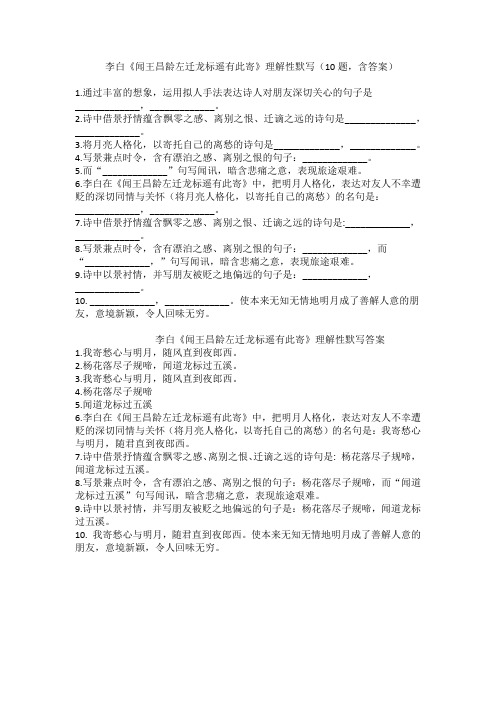
毕业论文Title:The Difference of Cultural Connotations Between Chinese and English Animal Words题目: 中英动物词汇文化内涵差异学生姓名王子璇学号BC1111104指导教师程兰讲师年级2011级11班专业英语系别英语系摘要美国作家、学者奈达指出:来自不同国家和文化背景的人们有越来越多的交流。
作为语言中最活跃的和灵活的一部分,动物词汇只有在不同的文化背景下才会有不同的含义。
动物词汇在人类的生活中有着广泛的应用,而这些词汇具有它们自己的的文化内涵。
一方面,一些相同的动物有着相同或相似的文化内涵。
而另一方面,由于不同的地理环境,历史,宗教,习俗等因素,英语中动物词汇的文化内涵并不完全与汉语中动物词汇文化内涵相符合。
通过对同一动物和不同动物在中英文化中内涵异同进行的研究可以促进中英跨文化交流。
关键词:动物词;差异;文化内涵AbstractAmerican writer, scholar Nida pointed: “people from different countries and cultural backgrounds has more and more exchanges, as the most active and flexible part of language, animal words only have different connotations in different cultures.”Animal words have been widely used in human life, and these words has their own cultural connotations. On one hand, the words containing the same animal image have the same or similar connotation. On the other hand due to the different geographical environment, history, religion, customs, the connotations of animal words in English do not necessarily coincide with those in Chinese. Through the study the similarities and differences of the same animal and different animal cultural connotations in Chinese and English we can promote cross-cultural exchange between China and England.Key words: animal words; difference; cultural connotationContents摘要 (i)Abstract (ii)Chapter 1 Introduction (1)Chapter 2 Relationship between Word and Culture (3)2.1 Definition of Word (3)2.2 Definition of Culture (3)2.3 Relationship (4)Chapter 3 A Comparison of Connotation of Animal Words in English and Chinese53.1 Animal Words with Similar Cultural Connotations (5)3.1.1 Identical Animal Words with Similar Cultural Connotations (5)3.1.2 Different Animal Words with Similar Cultural Connotations (7)3.2 Identical Animal Words with Different Cultural Connotations (8)Chapter 4 The Causes of the Difference Between Cultural Connotations (10)4.1 Geographic Environment (10)4.2 History (12)4.3 Religion and Belief (13)4.4 Custom (14)Chapter 5 Conclusion (15)Bibliography (17)Acknowledgements (18)The Difference of Cultural Connotations Between Chinese andEnglish Animal WordsChapter 1 IntroductionWith the social development and advancement, the exchange of China and England will become more and more frequently. But the problem is different countries have different culture, the cultural differences will be an obstacle to China's diplomacy. English as the official language used in the most countries, it is necessary to carry out a certain understanding to it. So we can have a degree of certainty about intercultural communication. Language and culture can not be separated from each other. Language is the carrier of culture and it reflects culture. And Language is influenced and shaped by culture. If we don’t have enough cultural knowledge, we can’t understand and use language correctly. Language is affected and restrained by culture. Word is the most active and sensitive factor of a language.Different language environment results different words have different cultural connotation, animal word is the significant part of word, comprehend those animal words meaning and cultural connotations are benefit for intercultural communication between China and English. If we can not comprehend the relationship of animal words cultural connotation in Chinese and English, it will make misunderstanding in the intercultural communication. In order to avoid misunderstanding in cross-culture communication, we should understand some common words cultural connotation both in China and Britain. This paper aims to make a comparison about the difference of animal words cultural connotation between Chinese and English.First, the author uses conception of culture and word to direct the relationship between word and culture, then through the relationship between animal words with them to proof the importance of animal words.Second, compare about the difference of animal words cultural connotationbetween Chinese and English. The author mainly analyzes the difference of animal words from the following three parts: same animal words with similar cultural connotation; different animals with similar cultural connotation; same animal with different cultural connotations. These differences caused by several reasons. There are four mainly reasons that cause difference among them: geographical environment; history; religion; custom.Comparative analysis is an effective method to learn animal word cultural connotation, and it is beneficial for students to study word cultural connotation. It can improve the ability of communication in English. Animal words have a wide variety of cultural connotations, we should attach importance to it and study it.Chapter 2 Relationship between Word and CultureIt’s si gnificant to understand the theoretical basis of cultural connotation between Chinese and English animal words. This paper’s focus is on the concepts of words and culture, if we want to discuss the relationship between them, we must know what they are clearly.2.1 Definition of WordWord is extremely familiar and significant in human life because every day we use language to communicate with others, language is constituted by words, to specify our practical instructions, to express of our thinking inside. Without words our communication will become extremely difficult.Language is the basis of communication and it is essential for us. We use it for communication everyday, our live depend on it. Word is the basic unit of language composition, language is consist by words, so that it can express the people's emotions. Animal words occupy a lot of percentages of words in terms of the total amount.2.2 Definition of CultureCulture, so far we have not summed up a satisfactory definition of it. Precisely bec ause this is a difficult task. Benedict states “It is culture, their common thought and rules that truly combine man together”. British anthropologist Tylor also point s culture is “complex whole which includes knowledge, faith, art, moral customs ability a nd habits of every living person.” In 1993, Wadhaugh asserts “a society’s culture consists of whatever it is one believe in some form and observe it acceptable to its members, and to do so in any role that they accept for any one of themselves.”These thought of culture almost covers belief, knowledge and social habits, etc.And these thought are worthy of scrutiny and they are wisdom of several generations. Scholars define “culture”for different research purposes. But they agreed that cultural is not inherent. Culture is gradually formed in society instead by genetic inheritance.2.3 RelationshipThe relationship between word and culture is paid close attention from man. In the history of human development, the word plays a vital role. Words and history are coexistence, and indispensable for human beings. Without the word, culture is unable to exist. They rely on each other and influence each other. From another aspect, without the knowledge of culture we can not shape the word. If we want to communicate with foreign countries we must learn foreign word, so that we can know their culture well. There are a lot of cultural differences between Chinese and English. Thus, the emphasis of study should be put on the contradistinction of different cultures.By and by animals play more and more important roles in the people's living. In the long period of time, animal words have got their own cultural connotations in different nations. During this course, people associate their feelings, happenings and natural phenomena with various animals. Many animals have become a kind of symbolism in people's language and thinking, and animal words play very important parts in communication. The conceptual meaning of a word is its definition given in a dictionary. Owing to the different cultures and histories in two languages, animal words' connotations do not necessarily coincide with those in the other. When dealing with the connotations of animal words, it is helpful for us to know about the cultural factors. Because language derives from the real life and reflects the real life, to know just animal words' conceptual meanings are not enough for English learners. Similarities and differences of connotations in two languages should be taken into considerations in cross-cultural communication.Chapter 3 A Comparison of Connotation of Animal Words inEnglish and ChineseIt is necessary to consider the status of animal words cultural differences in Chinese and English intercultural communication. Because whether in China or England the animal words have lots of cultural connotations. Different animals reflect the special culture of different countries. They play the significant part in the change of implication of animal words because of man's habits and customs, histories, daily life, and so forth. Thus, the same animal will have different cultural connotations in certain situations. So in some cases, animal words have a certain degree of similar connotation. Importantly, however, they have great differences in some extent.3.1 Animal Words with Similar Cultural ConnotationsOn one hand, identical animal words may have similar cultural connotations between English and Chinese which are totally correspondent. On the other hand, different animal words may also have similar cultural connotations.3.1.1 Identical Animal Words with Similar Cultural ConnotationsAs human beings live in the same world, they have more or less the same thought about species of animals. The same animals have the same living habits, although the culture between China and English are not same, the partial same animals still have similar cultural connotation. For example, “猴”and “monkey”, “狐狸”and “fox”, “wolf” and “狼” and so on.Chinese“猴” is match ed with the word “monkey” in Engli sh, and also it has similar extension and content in two languages. For example if a child who is very witty but mischievous, and get into a little trouble, people will say he is“像只小猴子一样淘气”in China,and English will say the child “like a naughty monkey”. So monkeywith the meaning of being naughty both in Chinese and English. In ancient times, there always have some person ordered some monkeys to do something very funny, and those monkey did it makes man laugh. That is why man use the word “耍猴”to describe “juggle somebody”, “laugh a t somebody”or “make somebody gaffe in” . There is a phrase “make the monkey to somebody” means “fool somebody .” So the connotation of monkey is similar in Britain and Chinese.The impression “fox” means “crafty and clever” either Chinese or English, so the connotation of fox is similar in England and China. Generally an animal’s living hobbies and obvious feature will decide it’s meaning, fox is a very typical example. So if an English man say someone “as sly as a fox” it will understand by Chinese correc tly. Fox also be considered as a sly animal in China, so Chinese man always say “狐疑不决(foxy and undetermined)”; In English, there spread a proverb about fox: “When the fox preaches, then take care of your geese. (每当狐狸说教,当心鹅群被盗).”“Wolf” is always used to describe people who are vicious and greedy, for example: “make a sleeping wolf wake up(自找麻烦)”;“meet a wolf(张口结舌)”;“beat wolves (出卖朋友)”;“cry wolf (狼来了)”;“do not weak up a sleeping wolf(莫惹事非)”; there are similar cultural connotation phrases in Chinese for example: “引狼入室”; “狼子野心” ; “狼狈为奸” .“Wolf”also has the meaning of being horny, so if some people wants to take liberties with others, he will make “a wolf-whistle(调情口哨)”and its expression are same as the “色狼”in China. In general, wolf’s cultural connot ation has no discrepancy in English and Chinese.We always use donkey to describe a stupid people, so the phrase “as stupid as a donkey”can be translated into “他笨得像头驴”in China. Parrot is a kind of bird imitates human speaking but they don’t know it s real meaning. Therefore parrot is given a mark in English as “to imitate people without thinking meaning.” We also use “鹦鹉学舌” in China to express same meaning.Definitely, these examples present the cultural connotations which are not totally same between English and Chinese. Although the Chinese and English culture aredifferent, some of the identical animal have the same cultural connotation, it makes us even know different cultures will have similarity in some respects. People living in different culture env ironment, but same as the human being the fundamental way’s of thinking and living are still exist some similarity.3.1.2 Different Animal Words with Similar Cultural ConnotationsWhen people want to empress some feelings, people like to find an animal and pin their feelings. Due to the different culture they use different animals to empress the same feelings. For example: “tiger”and “lion”, “cow” and “horse”.“Tiger”is considered as the king of all animals, but in Britain, people think “lion”is the same as “tiger”in China. When Chinese say “拦路虎”it will equal to English phrase “a lion in the way” , and Chinese phrase“像老虎一样勇敢” is equal to “as brave as a lion” in English. They both have the connotations of the strength and courage. There are s everal groups of contrast about tiger and lion.“An ass in lion’s skin” means someone looks very outwardly strong but inwardly weak, in China “狐假虎威”also have the similar meaning. So Chinese tiger’s cultural connotation and English lion’s cultural connotation are similar.In ancient China “cow” is an indispensable farming tools, with the cow’s help, they can save lots of time and manual, so in people’s mind “cow” is work hard without any complain. But in Britain “horse” play s this role, so when we say someone is very strong, as “像头牛一样健壮” and it means “strong like a horse” in English. We say people work hard we can say “老黄牛” in Chinese and say “a willing horse” in English to express the same meaning. When Chinese say someone “吹牛” his meaning is “someone exaggerated the facts”, it is equal to English “talk about a horse”. So there are similar cultural connotations between Chinese cow and English horse.In a word, different word in different culture perhaps have the similar meaning because of the same living habits.3.2 Identical Animal Words with Different Cultural ConnotationsDifferent countries have different culture, identical animals were given different cultural connotations, so there are many identical animal words have different cultural connotations, for example “牛” and “bull”, “狗” and “dog”, “猫头鹰” and “owl” .China is well known as an ancient agricultural country, “bull”as the main farming tools play a significant roll in the history, it is indispensable when people labor life. Therefore, the cow’s image has good reputation in ancient China, people also add their emotion reflected into language. There are a lot of cattle-related proverbs in Chinese, such as“of a multitude of books” (汗牛充栋); “parental love(老牛舐犊)”; “reformation of brigands(卖剑买牛)”; “to hang books on the bull's horn(牛角挂书)”;“obtain more than lost(亡羊得牛)”,and so on.In addition, Chinese people also used "bull" to describe a people. For example, use "sturdy as bull" to describe a person who has a strong body, with "the strength of bull" describing someone with great strength, with "work hard like old bull" to describe a person bears the burden of responsibility. People in English speaking countries did not regarded "bull" as "farmhouse treasure ", but as "the dishes". In their mind, bull is covered with disadvantages, for example " a bull rush into a china shop" means a people easy to get excited, "like a bull at a gate" means someone fiercely and recklessly. English people will say"rage throw the bull" when someone talk rubbish.The “dog” is a prime example. “Do g" is considered to be English people's best friend, but despicable in Chinese. English people love dogs, because they think dog is reliable, honesty and cute. So there are lots of phrase about dogs “A top dog” means VIP(very significant people); “a smart dog”means a clever people; “lucky dog” means lucky people; “Help a lame dog in a ladder” means to help people in distress. At the same time “old dog” mean s an old man who worth to respect.In Chinese’s mind dog have the meaning of being loyal , but most time, the meaning of dogs is derogative, for examples “鸡鸣狗盗”; “狐朋狗友”; “狼心狗肺”.In Britain, “owl” is considered to be the incarnation of intelligence and wisdom, italways appears in cartoon or stories as a teacher. People will say someone “as wise as an owl” i f he is very clever. So in English eyes owl is the symbol of wise. In contrast, Chinese considered encountering an owl will misfortune, it will bring bad luck to people who see it. “猫头鹰进宅,好事不来” this proverb proved Chinese people's idea precisely."Cat" is a small furry animal often domesticated as pets or mousetrap. In English speaking culture, "The cat",usually used to describe a woman who wicked . There are a lot of ways to describe it, “old cat” means a old woman who is bad tempered, a "cool cat" can be used to describe a fashionable person. “A cat live with a dog” can describe someone often quarrel with his roommate. "Cat nap" means a nap in the chair. In China, people like keeping cats as pet because of its cute looks. When we say “she is a cat”, it means she is very cute and docile. The "cat’s food" is not food of cat, we will say when a person has a poor appetite. "Cat's eye" is not a cat's eye, it is a precious stone; "A cat cry foe a mouse", refers to crocodile tears. Though the same animal almost have the same living habits, because of the different culture and some other reasons which makes people have completely different comprehension. Naturally, because of the different countries have different culture Even the identical animal will have different meaning.Chapter 4 The Causes of the Difference Between CulturalConnotationsThe different cultural connotations of animal words are caused by kinds of reasons. With the frequently increasing intercultural communication between China and England, we should know the difference and the causes of it. The language inherits the culture and the culture control the language. Because different countries have a variety of difference, so the difference of animal words cultural connotation can be analyzed according to the following reasons.4.1 Geographic EnvironmentThe animal words in China and English have lots culture connotations differences. Geography is one of the reasons. Environment is an important factor of shaping the cultural connotation.“Cow” has made too many contributions in Chinese agricultural history, so“c ow” is considered as the symbol of “hardworking without complaint”. Britain is a n island nation, their lives are inseparable with fish. So fish has a very nice image in their minds. So there is a proverb: “The best fish swim near the bottom;” and also “ If you want best fish you should go to the sea.;” as the same meaning as Chinese “不入虎穴,焉得虎子.” “It is a silly fish that is caught twice with the same bait (智者不上两次当)” .Precisely because Britain is an island country, this led to the changeable weather of Britain. We all know climate will influence people’s life in a great extent. Language influenced by environment, so word have a close relationship with geography. For example “It rains cat s and dogs (倾盆大雨)”;“A swallow can not make a summer(一燕不成夏)”; “pig can see the wind(猪燥兆风暴)”;China has thousands of years of farming history. So there are lots of animal words expression about agriculture, s uch as: “oriole sing, wheat cutting(黄鹂唱歌. 麦子要割)”;“Cicadas called, cut rice. Cicadas cry, beans late.(知了叫, 割早稻. 知了喊, 种豆晚. )” “Wild goose coming , planting wheat.(大雁来,种小麦. )”.Through analyzing different geographical environment we get a conclusion. Because Britain is a country that composed by the island, their territory are not broad enough, it makes them aggressive, they must expand cross-cultural exchange if they need seeking to develop with outside. We need to spend more time studying it.China as a mainland country has rich land and significant resources, Chinese people think agricultural income brought sufficient to satisfy all their simple demand. It makes China become lack of communication with the outside world. Therefore, China needs to improve diplomatic skills.Environmental differences make geographical differences, it caused the difference above. In fact, when we study animal words, we should focus on those geographical knowledge that benefits for us to understanding, understanding the environmental differences makes us easy to study the difference of animal words cultural connotations in English and Chinese.Under the influence of different geographic environments, some animals have connotation vacancies in one country.Beavers is well known in western countries but only few people know it in China. Reportedly it is be expert in build their nests that use the branches they biting down. Beavers is an active animal, and they have agile physique. So English man always say someone “an eager beaver”if he is a witty and diligent. But “an eager beaver”is a derogatory phrase.In summary, geographical environment is one of the reasons of the animal cultural connotation differences.We should understand that geographical knowledge about cultural connotations of animals so that we can know more knowled ge about animal word’s culture connotation. If we can use these knowledge expertly, learning animal word cultural connotation will become easily..4.2 HistoryDifferent countries have different processes of development, we call it history. Different histories make culture is not same in different countries. History is one of the most significant factor affecting the cultural connotation. Studying different histories are benefit for understanding the difference of animal words culture connotations. Because the history of Britain and China are quite different, the cultural connotation of animal words will be different.Dragon, as the most significant totem of China, dragon cultural implication with the heaven and man oneness that Chinese attach importance to. In ancient China “dragon”means noble, dignified, domineering, it was the symbol of power. So, in China formerly feudal society, people believe their emperor is “真龙天子”(the dragon’s son). Everything of emperors are closely linked with the dragon, there clothes was called “龙袍”(dragon robe) because of his cloth embroidery or patterns of dragon. Their seats are“龙椅” (dragon chair); their children are call “龙种”(dragon children).China is a country with a long history. Its culture has inherited five thousand years. In China long three thousand years feudal history, dragon’s position has been paramount, only the royal family can use this word. With the the abolition of feudal system, dragon become a word with derogatory meaning. People use dragon to express their wishes and blessings. Such as “望子成龙,龙腾虎跃,生龙活虎”.The rapid development of China's described as “腾飞的巨龙”. However, the meaning of the dragon in the UK and China are not same, but opposite. In British mind, dragon symbolizes a ferocious monster, and will take disaster to people. So dragon-related phrase in China will be translated into tiger instead in English.Xiezhi(獬豸)is an auspicious with the sheep's body and Kirin’s appearance, it have the power to judge good and evil, and misbehaving people will be punished. Therefore, l ater, people put his portrait into the judge’s official uniform of feudal era. But its horn have nothing special. Although there is only one angle on its head, it has no relationship with unicorn. Unicorn only appeared in the British legendary. It is different withXiezhi(獬豸), it have brought fear for humans and animals. Unicorn acted quickly and very powerful. Unicorn behalf of the noble, proud and pure, it is a mythical beasts in fantasy.In Britain “cook goose”means making someone's plan fail or beating someone. But it just mean to use goose make a dish. This story originated from an old story, in the middle Ages of Britain, a city was surrounded by their enemies suddenly. At this time a resident made a mistake, he killed a goose and hanged it on a tower. Those enemies can not accept such mortification, they frenzied attack that city and conquered the city quickly. Then they cooked that goose which was killed by the inhabitant.Since then, “cook goose” got the meaning of beating someon e. Such as “We must cook their goose, otherwise our efforts will be in vain. (我们必须战胜他们,否则我们的努力就白费了.)”Different histories created different culture, different culture resulted in different cultural connotations of animal words.4.3 Religion and BeliefReligion is a cultural phenomenon, and the influence is obvious and profound, and it was particularly evident in the language. Because the religious beliefs are not the same in different countries. In China Buddhism spreads very widely and there are a lot of believers. In England their animal words meaning are influenced by Christian in a large extent. So “一贫如洗” is means “as poor as a mouse in the church” in English.In Chinese folk legends, a thousand years old bat will become a white bat, and someone will live longer if he eat it. In China bat has the same pronunciation with blessing(福) . Therefore bat in China meaning “lucky”; “Everything goes well”,Bat always appear with deer and it pronounce “福禄”in China. Red bats more is consi dered a sign of good fortune, because the "red bat" has the same pronunciation with “洪福”. In England , people think bat is devil because its ugly appearance and cruel habit. They think they are evil things. We can understand its image from the idiom “blind like a bat”; “crazy as a bat”.The Bible has become part of the British, as Christians, they believe in the words of the Bible. There are many animal words became religious overtones under the influence of the Bible's. For example: “sheep” “goat”and “lamb” , “sheep” means a mercifu lness person. In contrast, “goat” refers to the person vicious, “lamb”means the Jesus suffering for people.There are a lot animals cultural connotations affected by Buddhism. “佛口蛇心”(honeyed words but evil intent ), it means a very vicious people seems like kind.From many examples it can be seen that religion and belief are the important factors affecting cultural differences. If we don’t know the religion and belief, it will be difficult for us to understand the cultural connotation correctly.4.4 CustomCustoms are habits in some areas formed small things. Different customs make the word “dog” appeare d differences in the cultural connotation in Chinese and English. Though both Chinese and Britain people like keep a dog as a pet, but dogs has the different status in their hearts.In China dog is just a kind of gatekeeper, people keep it for safe or hunt, they do not think dog is their friends, they think dog is dirty. Dog is regard as the derogatory term in China when people use it in someone. This kind of thought will not change in a short time. Chinese think dog is an animal makes people sickening, “Every dog has his day.”(每人都有得意之时). In Chinese people’s mind dog is servant of people, but it is friends of British people. In England dogs have their own food, there own house, own cloth, the most unexpected is that they have their own doctor. When they are weak, they will get several days holiday. Some British people use the word dog to instead friend, it makes Chinese greatly puzzled.A little difference of customs can make a great difference in cultural connotation. We should pay attention on customs difference if we want know more about the different between Chinese and English animal words.。
- 1、下载文档前请自行甄别文档内容的完整性,平台不提供额外的编辑、内容补充、找答案等附加服务。
- 2、"仅部分预览"的文档,不可在线预览部分如存在完整性等问题,可反馈申请退款(可完整预览的文档不适用该条件!)。
- 3、如文档侵犯您的权益,请联系客服反馈,我们会尽快为您处理(人工客服工作时间:9:00-18:30)。
闻王昌龄左迁龙标遥有此寄中考题集锦
1这首诗开头一句写景除了点明时令外还有什么作用?
2;首句有哪些意象?
3最后两句运用了_手法,表达了诗人对朋友的__。
4;从哪些诗句可以看出王昌龄被贬之地偏远?
5;赏析;(1)杨花落尽子规啼,闻道龙标过五溪。
(2)我寄愁心与明月,随风直到夜郎西。
答案;1;渲染凄清的气氛,衬托离情别绪。
2;杨花;子归鸟
3;想象(拟人);同情关怀(思念关怀)。
4;闻道龙标过五溪;随风直到夜郎西。
5;(1)起句用笔奇巧,写景中暗愚节令,描绘出南国的暮春景象,烘托出一种哀伤愁恻的气氛,杨花飘落,子规啼叫,诗人撷取这两种景物加以描写,含有飘零之感,离别之恨,情在景中,情景交融。
(2)诗人通过丰富的想象,用男女情爱的方式抒写志同道合的友情,给予抽象的“愁心”以物的属性,它竟会随风逐月直到夜郎西,想象惊人,气概超逸,气势灵动,充分显示出诗人的艺术个性。
(以拟人化的手法写月,赋予月亮以人的特征,李白内心的悲愁无可排遣,无人理解,似乎只有月亮才是真正的知音,诗人只好把满腔悲愁和深深的思念托付给明月,带给远隔千里的天涯沦落人,表达了诗人对朋友的同情和关切。
)。
